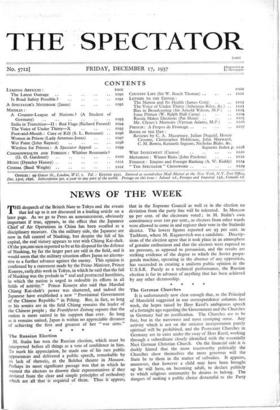The Russian Election M. Stalin has won the Russian election,
which must be interpreted before all things as a vote of confidence in him. To mark his appreciation, he made one of his rare public appearances and delivered a public speech, remarkable by its lack of rhetoric, at the Bolshoi theatre in Moscow. Perhaps its most significant passage was that in which he warned the electors to disown their representatives if they deviated from the clear and simple principles of orthodoxy which are all that is required of them. Thus it ' appears that in the Supreme Council as well as in the election no deviation from the party line will be tolerated. In Moscow 99 per cent. of the electorate voted ; in M. Stalin's own constituency over too per cent., as electors from other wards were allowed to come in and register their vote in the Stalinski district. The lowest figures reported are 93 per cent. in Tashkent, where M. Kaganovitch was a candidate. Descrip- tions of the election agree that it took place in an atmosphere of genuine enthusiasm and that the electors were exposed to no pressure, as opposed to persuasion, and the results arc striking evidence of the degree to which the Soviet propa- ganda machine, operating in the absence of any opposition, has succeeded in creating a uniform public opinion in the U.S.S.R. Purely as a technical performance, the Russian election is far in advance of anything that has been achieved by any other dictatorship.














































